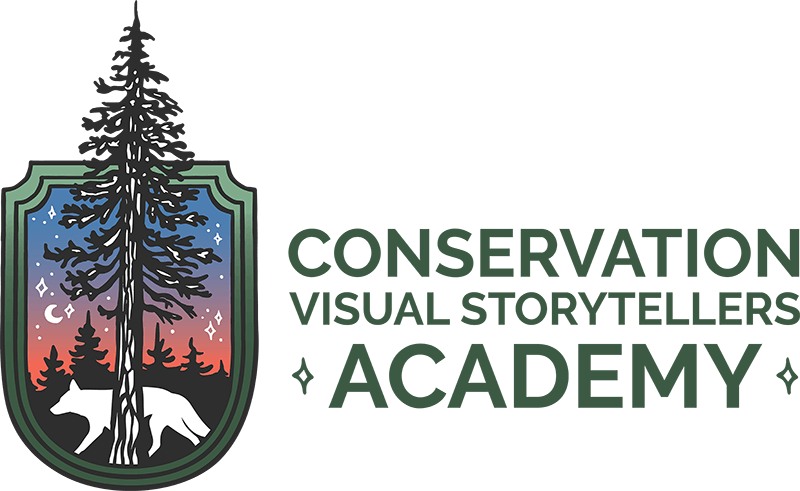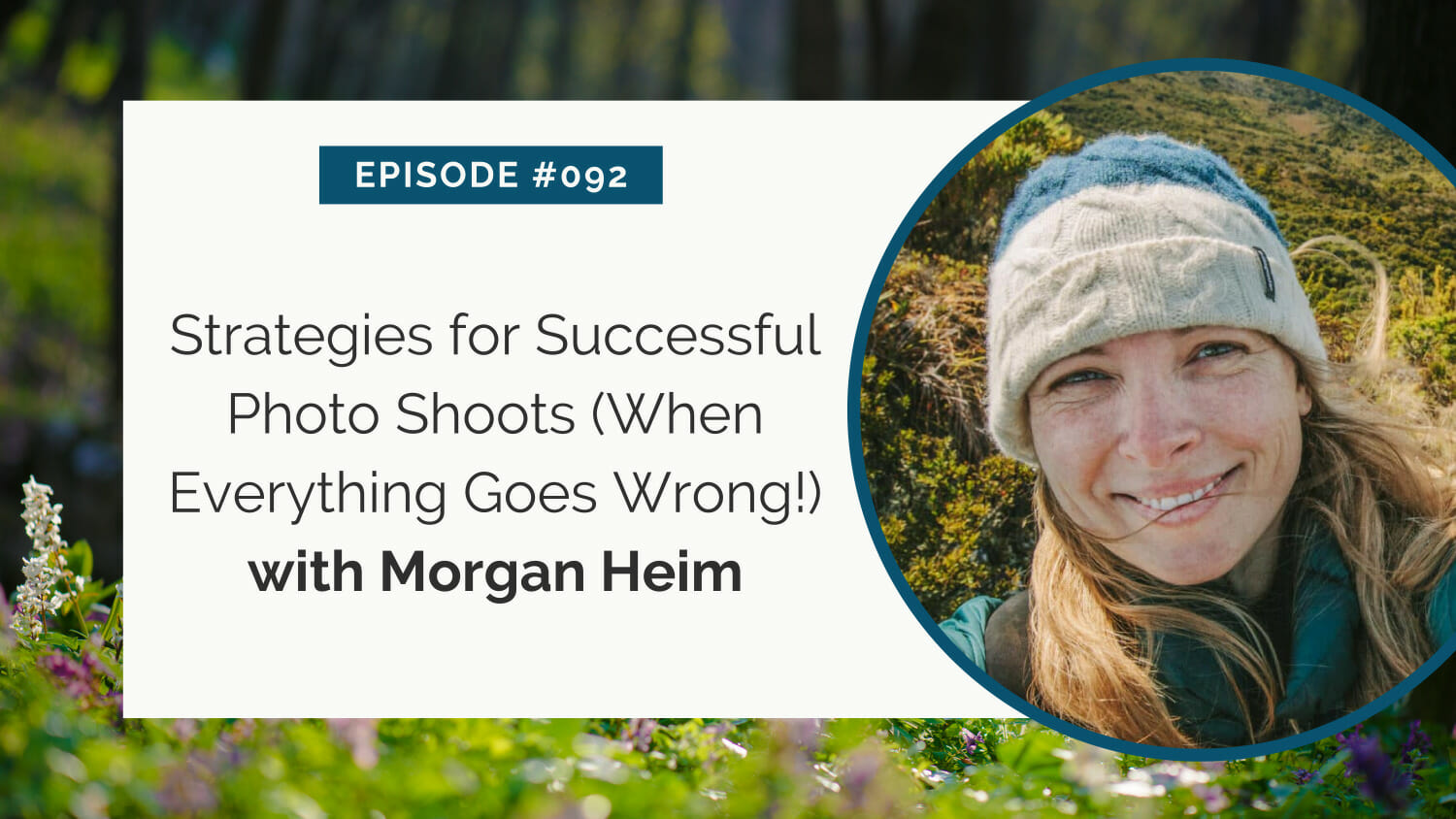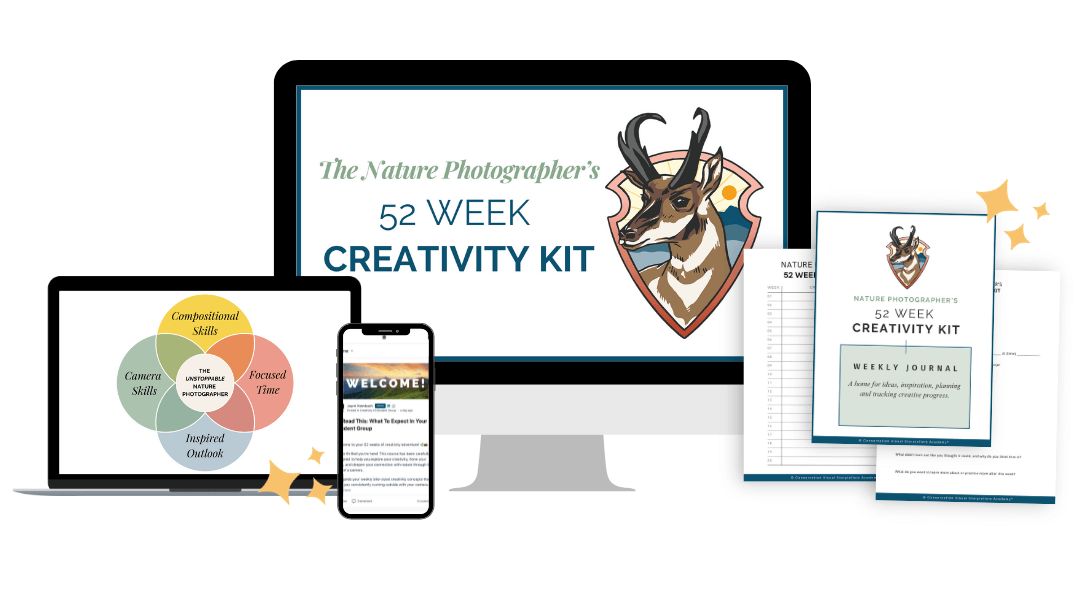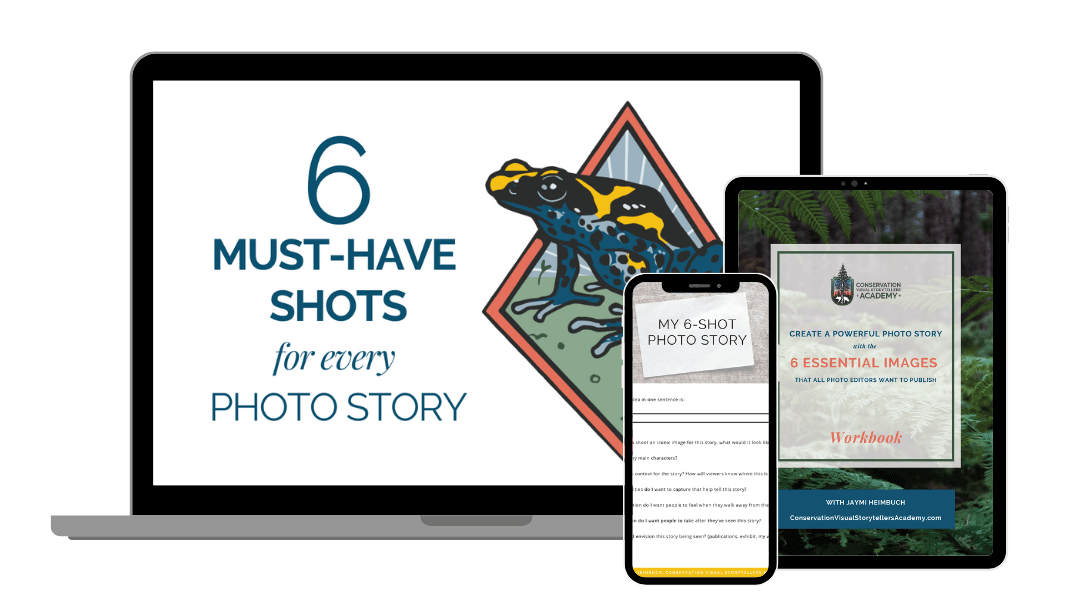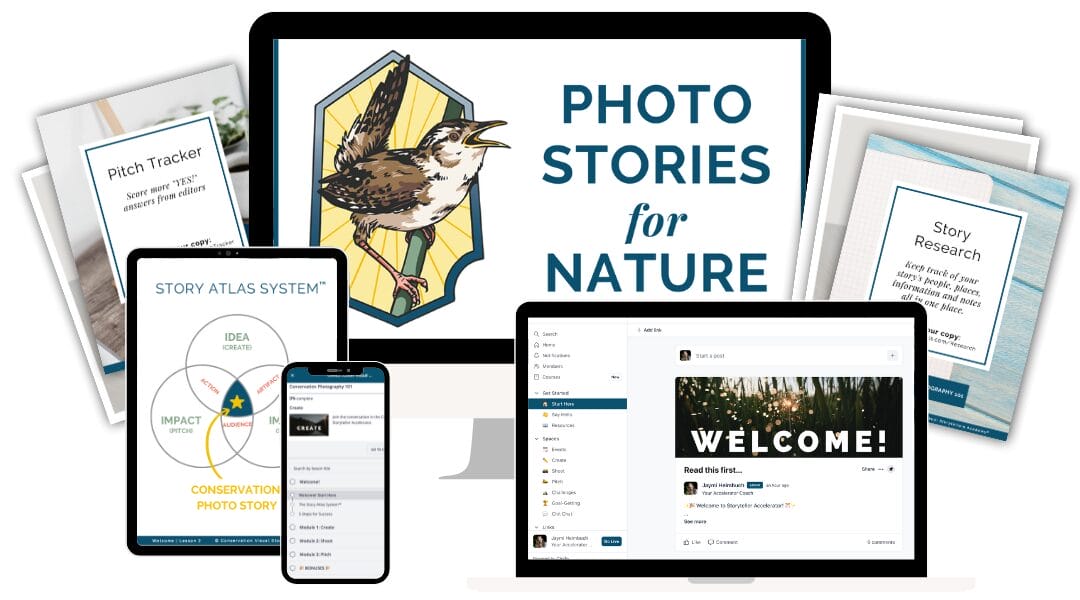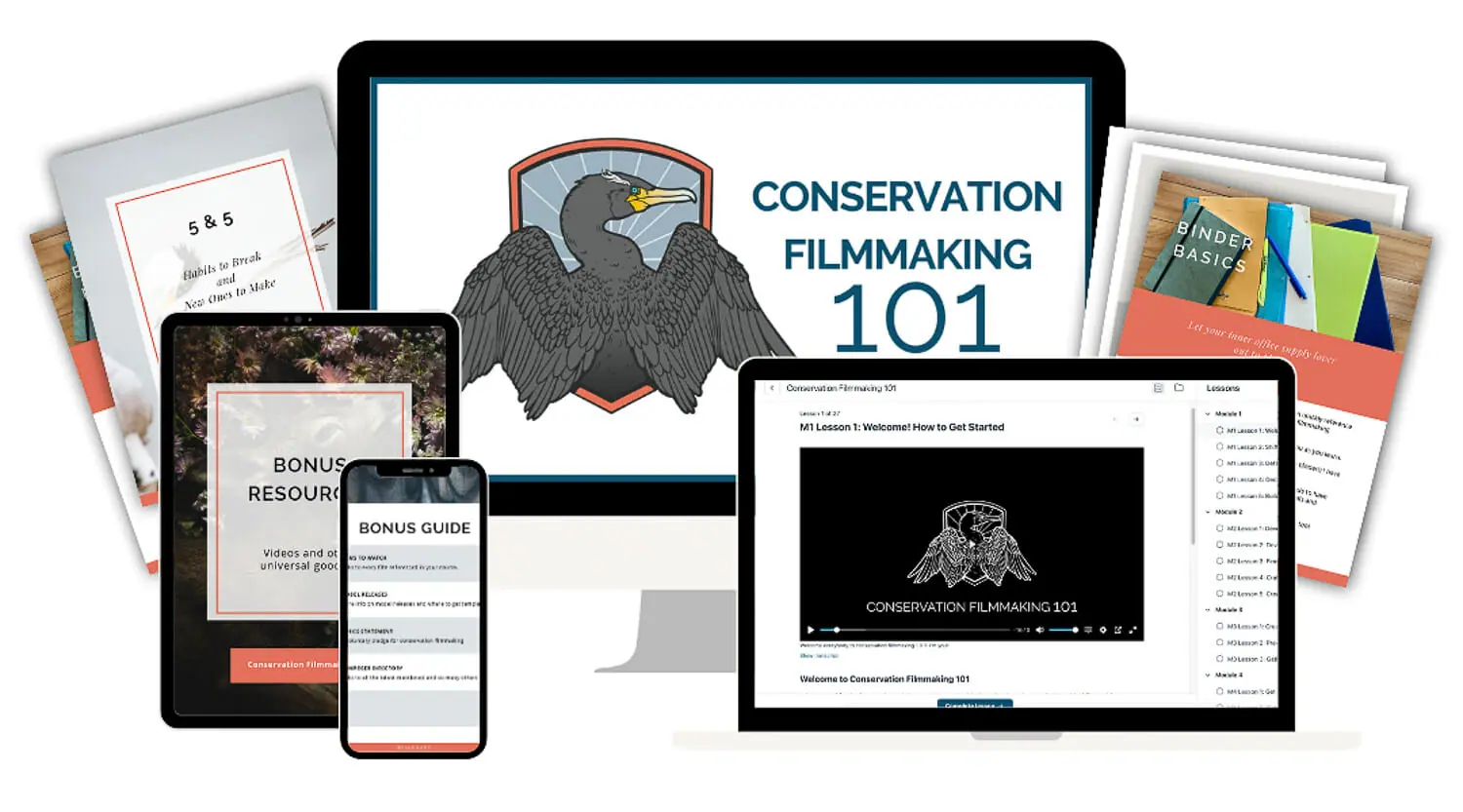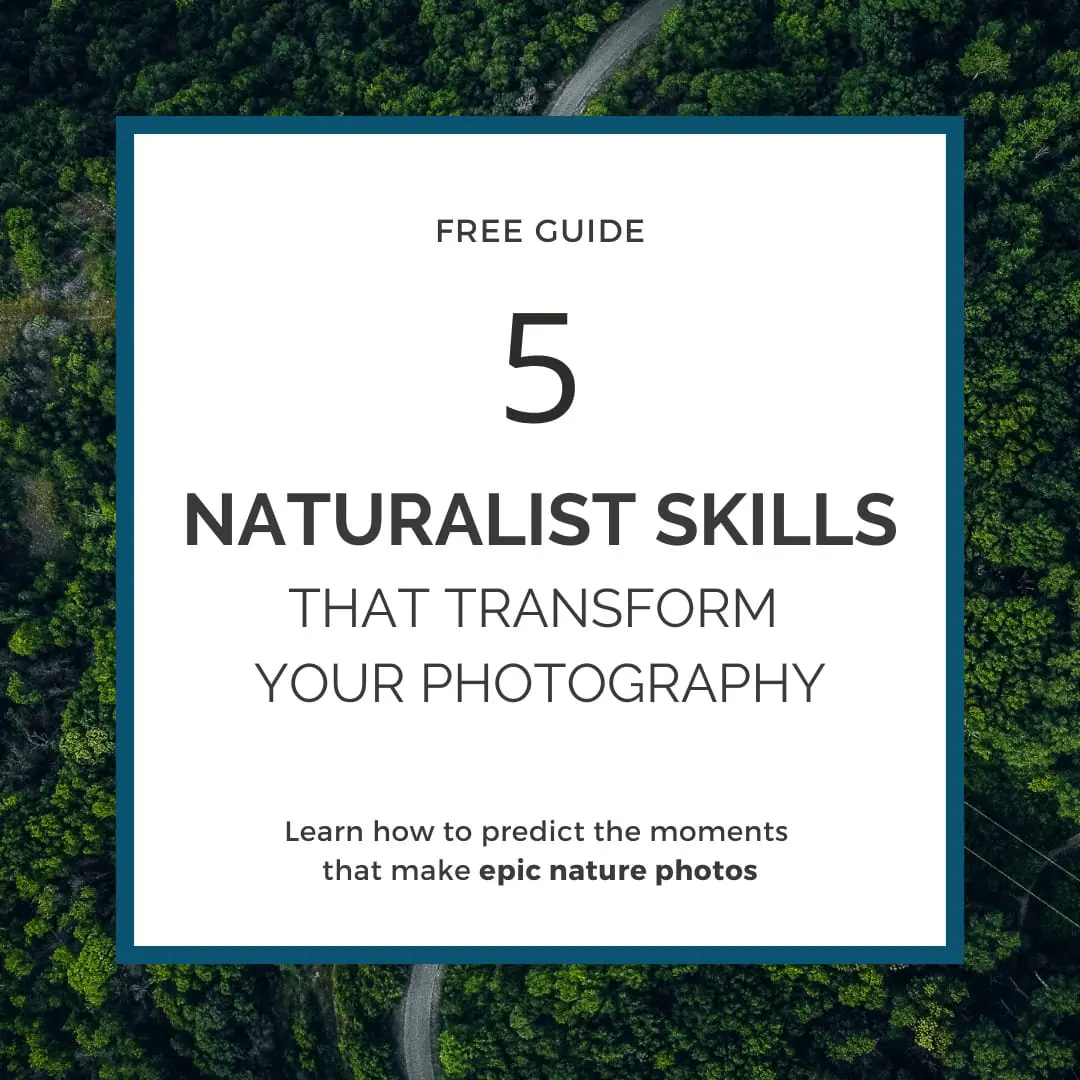Strategies for Successful Photo Shoots (When Everything Goes Wrong!) with Morgan Heim
Things will go wrong. They always do. But here's how you get through even the most haywire moments in your photography.
Best question you can ever ask a professional in any field?
“What did you do it all went wrong?”
Because it does. For every visual storyteller (pro or not).
There are moments – and may be you've already experienced them – that have you howling curse words at the sky.
Or the bottom of your stomach drops out when you show up for a shoot and NOTHING is as planned.
All the self-doubt voices start ganging up on you. You question life, the world, your existence.
Ok, maybe not that far.
But you're definitely wondering how you're going to pull it together and fix what's going wrong.
That's when asking the pros to spill the details on all their horror stories comes in handy.
And not just because they're so fun to listen to.
(If Fear Factor + American Idol auditions + Real World had a baby, it'd be almost as good as stories conservation photographers bring back from the field.)
It's also because ultimately, professionals are successful – hence, being pros – which means you learn what they do in those moments to recover, to make the most of it, to get the shot.
It's strategy you can use. (Because you'll need it. I promise.)
So, I've brought someone onto the podcast who is an expert in not just photography and filmmaking, but also camera trapping.
(Hellllllo, gear drama!)
And holy heck does she have stories for you. Hard-earned stories.
In the years of witnessing Morgan Heim at work, I've learned that whatever sh*tshow is happening right now in her shoot, she's gonna pull off magic.
But she's not magical.
She's a normal, regular person, who simply puts strategies into play to make sure that spiral of “what the actual F” transforms into “Fantastic!”
She spills the beans on those strategies so when you find yourself
- … on your knees screaming at the sky because you left your memory cards in the car 5 miles down the trail
- … or excusing yourself to go cry behind a tree because your shoot just got called off for the 4th time due to rain even though you drove 7 hours to be here (again!)
- … or crawling into bed at 6 AM after having spent the entire night throwing up over the side of a ship when you were supposed to be photographing the research for a publication assignment and you are just sure you'll be black listed for ever and ever and ever
well, you'll know exactly what to do next.
Have a listen, take notes, and take comfort.
Things will go wrong. They always do.
But you've got this.
Resources Mentioned
Episode 092: Strategies for Successful Photo Shoots (When Everything Goes Wrong!) with Morgan Heim
Shownotes: ConservationVisuals.com/92
(Digitally transcribed, please forgive any typos)
Jaymi Heimbuch: Well, Morgan, welcome back to the podcast. You're officially our most frequent guest
[00:00:09] Jaymi: and starting out 2022 with you, I can't even believe that we're in 2022, is wonderful because the topic that we have today is one that I think it's going to be really interesting because we have, I think I've been programmed to be really nervous about looking forward to things or making plans or, you know, troubleshooting.
[00:00:28] Jaymi: And so we're talking about like, Hey, when things go wrong, here's what you can do to get through it. So it's kind of like this, this way of chugging forward, no matter what happens, attitude to start this year.
[00:00:40] Morgan: Oh, yes.
[00:00:41] Jaymi: Awesome. Well so today we're talking about when you have some pitfalls in the field, how you overcome those pitfalls.
[00:00:50] Jaymi: And before we dive into the three particular, very common pitfalls that happen, what's been one of the most memorable or [00:01:00] most eye-roll worthy pitfalls that you've experienced in your field work. And your many years of getting out of thefield?
[00:01:08] Morgan: Oh my God. I have to pick one.
[00:01:09] Morgan: I would just say well, in a general sense that you get out there and some piece of equipment has decided to choose that moment to. Checkout and not have any interest in checking back in. So it has occurred in many varieties and forms and I've had to try to figure out, okay, how do we still make this work or make something work?
[00:01:38] Morgan: Given that a piece of equipment failed, I mean, and sometimes for no rhyme or reason you seriously think there's goblins, Just rummaging around in your camera bag when you're not looking.
[00:01:49] Jaymi: Yeah.
[00:01:49] Jaymi: I remember you had a shoot. It was for your trespass story and something went a gray with your camera trap.
[00:01:56] Jaymi: And I can't remember what it was, but it was just like, this was fine [00:02:00] until I arrived here. Do you remember what happened with
[00:02:02] Jaymi: that?
[00:02:03] Morgan: Well, I remember screaming a swear word at the sky. Literally, and I wasn't by myself, either the law enforcement officers were like, are you okay? I was like, yes, the camera trap.
[00:02:17] Morgan: So I mean, there are things that happen where it's like a cord isn't community decided to stop communicating with a flash and literally like, 10 seconds earlier. It was fine. And then you put it down on the ground and it's like, you gently tap it. And it is like a terrible TV set with an old antenna or something.
[00:02:38] Morgan: And it suddenly is like, Nope, not working now. Something got jostled and you don't know on what end. Yeah, so I have a feeling in that instance, it was kind of that situation that was going on, where I had just been fixing batteries, getting things, communicating, and then one of the transmitters.
[00:02:55] Morgan: Stops talking to the other one. And you're like, why? Did a button get hit to [00:03:00] change a channel? When I was taping up the cover, that's supposed to keep the water out and cause those buttons are so freaking sensitive. If you breathe on them wrong, they changed to it. Setting. And you're just like, I hate you.
[00:03:14] Morgan: I just want
[00:03:17] Jaymi: well, so yes, that's frustrating, but should we go the route of troubleshooting those things? Because it is a big fear that a lot of people have, especially when you're getting started you know, you're moving past working on your own projects or your own stories and you're getting into.
[00:03:33] Jaymi: Working on projects or stories for other people. So maybe you've been assigned something by an editor or you've been hired to go do something. And so all of a sudden it's a really scary thing to get out into the field and you're panicking that something, some piece of equipment is going to fail. Something is going to go awry.
[00:03:52] Jaymi: So how do you mentally prepare yourself so that, or, and also physically prepare yourself? [00:04:00] The kit that you take so that you know, that when you get out into the fields, should the worst happen. You're going to figure out how to get through that. What does that look like?
[00:04:08] Morgan: Yeah. Well, so I mean, first off you, you do put the time in to just be going through the geared checks before you get out to the field, you know, and trying to just double check that you have all of the right parts and that the parts are working.
[00:04:23] Morgan: I can't tell you the number of times where I've thought I had all the right parts and. Somehow in the transport from like car to the field site. I find out, oh, I left this cord in a pocket, in a bag that I didn't bring. And so then it becomes this game of just being like, look, well, that sucks. I gotta walk another couple miles back to the car and then a couple of miles back out to the site, but I have to do that.
[00:04:49] Morgan: So the first thing is prepping the gear. The second thing is making sure you you've packed it all when you are actually heading [00:05:00] out. And then the third thing is when the inevitable happens is just going into the whole experience with one, the mindset that something's going to go wrong. That doesn't mean you're a pessimist.
[00:05:13] Morgan: It just means you're kind of preparing for the eventuality that, of all of these moving parts, there's going to be something that's going to not go as planned. And the second thing is that when that happens, that you are going to just buck it up and you're going to do, you're going to go through every avenue of like, these are the things I can try to do to fix it, or have a contingency plan.
[00:05:39] Morgan: And sometimes. Sometimes that contingency plan might be something you create in the moment in the field where you're like okay, so this happened, I have this much time for this project. I can't deal with it today. Can I, can I deal with it tomorrow or the day after tomorrow while I'm out here? And you have that [00:06:00] mindset of , I'm gonna, do whatever I have to do .
[00:06:02] Morgan: Within every human possible factor and resource I have available to fix this and make it work. That's all you can do. The last thing you can do is be like, do I have a different approach for trying to accomplish the kinds of things that I need to accomplish on this? And will I be willing to let go of the camera trap image on this trip anyway, because it's just not gonna happen.
[00:06:26] Morgan: Yeah.
[00:06:27] Jaymi: Yeah. One of my friends that reminds me, one of my friends went to Ethiopia to photograph the Ethiopian wolves and took, I think it was a 500 millimeter prime or like a 400 prime or something like that and got out there and some little screw that allows you to change the aperture got dislodged. So she was basically stuck at wide open for the three weeks.
[00:06:50] Jaymi: There's no changing anything about that. And she had to just be like, well. I'm going to have shallowed up the field and everything. I'm going to shoot what I can and be like, this is the [00:07:00] aesthetic that everything's going to have. What can I do with this? And that's it. And there's, cause there's sometimes nothing that you really can do.
[00:07:07] Jaymi: You're just going to have to. Jerry rig whenever it is that you have one question for you is do you ever, cause I, I always advocate having a contingency fund in every budget for whatever you might need to also factor in that that's an unexpected thing. How often do you factor in a contingency fund for just equipment that you have to buy on the fly?
[00:07:30] Morgan: Pretty much never. It's not that I don't want the contingency fund. It's just that I never get budgets that allow for it really. So the contingency fund typically is my personal money. When I did the shoot for Smithsonian on the Lassen wolves,
[00:07:48] Morgan: one of the methods to try to get a cool photo of the wolves was to camera trap. It wasn't a super long assignment, so I didn't have like high hopes for the camera trap or anything, but I had [00:08:00] brought one set up and I set it up on a cow carcass. It had died actually, because it got its head stuck in some infrastructure that had been left out there by the humans for the cows.
[00:08:16] Morgan: And then, you know, predators were coming and feeding off the carcass. And that happens a lot. When cattle die out, out in the field, that's what happens, whatever wild animals are, there will come feed off of it. So I was like, oh, I'll put this camera trap on this. Cow and hopefully the wolves will come and feed on it and I'll get some really cool photos while I put the camera.
[00:08:38] Morgan: I set it up and the next day I found my, my trap. It was like someone had taken , just like a baseball bat and hit it across the field. And it was because a bear had come and was just like, I want this outta here and swatted it and I just picked up this camera that was just covered in cow dung, and I turned it on and [00:09:00] it was working, but then all of a sudden it was just like, yeah, you can't act, it works.
[00:09:05] Morgan: It will take a photo, but you can't access any of the menus. So I can't change any settings or anything like that. And I was just like, great. My camera's just dead. And so I made the decision that I had. I was like, well, I'm technically. An hour from a town that has a Walmart. So I went and dropped 400 bucks on a, just a cheap Canon rebel that would work with my setup and was able to continue using that trap throughout the assignment.
[00:09:35] Morgan: But there was like four to $500 that just went down the tubes. I tried to look at it as like, well, no, I haven't. You know, camera, body for camera traps. Although I guess I'm still, I'm still actually just breaking, even because if I want the other camera to work, I have to like probably spend five or $600 to go get it fixed.
[00:09:53] Morgan: Right. Right.
[00:09:54] Jaymi: Oh man. So one you're mentally preparing yourself for like something like that's going to happen. And [00:10:00] especially when you're in the whole camera trapping world, because there's so many pieces, so many components, so many things that go together. What happens if you. Just flat out, can't replace gear that you're using.
[00:10:13] Jaymi: You mentioned thinking about getting what you need to get for the visuals for the story, but in a different way. Can you talk about that a little bit in terms of like mentally strategizing new ways to approach something, using whatever you've got left with you?
[00:10:28] Morgan: Yeah. Um, You know, if you've tried everything you can, you've tried taking apart everything that you can take apart and putting it back together.
[00:10:36] Morgan: And it's just, nothing's working and you make that decision and you just got to let a certain shot go because of the technology. I make a list of all the images that I think are important that I can still get, And so they started to do a little bit of an assessment of like, is, is this assignment or project dead in the water?
[00:10:56] Morgan: If on this trip, I don't get this one particular shot. And.[00:11:00] It's pretty rare. I think, where it's like, that was the single shot that you had to do , for your assignment to work. So I take comfort in that. And then I, I then assess like, okay, instead of a camera trap shot, is it possible to set this up with.
[00:11:19] Morgan: A remote trigger, where I can set the camera up, I can go back into my, a blind or something and I'm just sitting there waiting and I'm going to trigger it that way. And that's at least a chance that the animal might come by my camera and give me the same effect. So I just start immediately trying to think of if there's any other options like that, I can try.
[00:11:40] Morgan: Otherwise, it is a matter of , okay, am I going to spend more time in the field, sitting in a blind and try to get really awesome long lens shots? Can I make any of my other photographs that tell other parts of the story more dynamic and interesting and get more creative that way with how I'm going to shoot it I'm doing this all the time anyway, but like, [00:12:00] can I use lighting in a creative way to, you know, have that kind of.
[00:12:05] Morgan: Rich, almost cinematic look to the images. So that all the pictures that are in there they make people kind of feel like they've fallen into the story and they don't care as much that there's not the, that one. They don't know the picture that they're missing, you know?
[00:12:20] Jaymi: Right, right. Yeah.
[00:12:22] Jaymi: That's wonderful. Well, I think that it reminds us all as creatives that we have to lean on creativity when we get out there, when things inevitably go wrong. And it's a really great reminder too, because we always hear the comment, especially when you have fancier equipment that like, oh, that's a really great camera.
[00:12:38] Jaymi: You must get great pictures with that. Well, no, it has nothing to do with the camera. It has to do with the photographer moments like that are great reminders about how. The way that you come out of a situation like that is based on you and your creativity and resourcefulness. And sometimes there's no getting around whatever's happened with equipment, but some often there is often, there are ways that you [00:13:00] can just work around and take the best attitude possible and come out of it.
[00:13:04] Morgan: Yeah. I think you have to also just like change your expectations. It's one thing, if it's a long-term project in all likelihood a project that you're is one of your passion projects, or if you're so lucky to get some well-funded long-term project where, you know, you're going to have multiple chances to go out in the field.
[00:13:23] Morgan: And it's really important to remind yourself that every single photographer. No matter how professional, even the top, consistently employed national geographic shooters, they have so many stories of where just . Everything went wrong and the shot couldn't happen and they had to figure out something else.
[00:13:45] Morgan: Or they had to like, wait till the next trip and go back and try it again because the conditions just didn't come together. Something failed, the animal didn't show up. There was a coup I mean, you never know what's going to happen. So having that [00:14:00] mindset of it's okay. If I don't get it all on, this five day shoot, I get to go on which a lot of times, if you're working on assignment for our publications you're looking at a three day to maybe a week long assignment, if you're lucky.
[00:14:15] Morgan: So. I think too editors are like, yeah, you're working on a wildlife story. That's really complex. And you've only given you five days to shoot it. Like there has to be a level of understanding there that you can only get so much. Yeah.
[00:14:29] Jaymi: Yeah. Well, and that actually leads us into our next hiccup that needs to get trouble shot troubleshooted.
[00:14:36] Jaymi: But a really common hiccup that pops up. Can be that you get out to the field and often this happens on assignment because you have less time to structure everything, but you get out into the field and the access that you thought you would have to get imagery actually doesn't end up being the case.
[00:14:57] Jaymi: Maybe it's it's polled [00:15:00] or there was miscommunication or something. So what have you experienced in this realm? And what's your advice for troubleshooting that access?
[00:15:10] Morgan: Yeah. That's definitely a very real thing. And it's something that often makes you feel just like you're banging your head against a wall.
[00:15:17] Morgan: Cause often it's, so it feels so out of your control I had a situation like that also happened on the Smithsonian assignment. It wasn't really fun, but very challenging assignment. But yeah, we're, you know, I was given permission to come down. And embed with the biologist while he was doing his work and document the story of the wolves and stuff happened that had nothing to do with me between getting that assignment and getting down there where things dynamics between some folks got really tense and went sour and people were like, we want to revoke access.
[00:15:55] Morgan: We don't want you going with the biologists as he's capturing the wolves, because one agency [00:16:00] got really sensitive about that and how that might look, and then private land owners didn't want me going on their private land, which is where most of the work was happening, even though they had previously granted the approval.
[00:16:12] Morgan: And I had enough, you know, again had nothing to do with me. And at that point it's like it might feel like. Everything's spiraling out of your control, but I think the biggest thing is to just know, okay, I'm going to do everything I can to try to create the opportunity. And so I immediately start going through this checklist of , who can I talk to?
[00:16:35] Morgan: Who can I email or call who are my allies in this scenario? My editor, Jeff Campagna, like, oh my gosh, he was such a great ally to have in the field on that assignment, you know? And it did become a thing where it's like your editors. I think aren't just there to like, look at your pictures when the assignment is done, they are your partner in a lot of [00:17:00] ways with the field.
[00:17:01] Morgan: By and large, they're entrusting you to navigate everything, but if you do really run into a snag there, I think they're there to like consult with you or have your back. And so I immediately contacted Jeff when this kind of arose and it was just doors slamming in my face left and right. And I was like, I don't even know why I'm down here.
[00:17:20] Morgan: And he, he got. On the phone. He made phone calls and emails to the person who was basically shutting all those doors. And at the end of the day, none of those doors got opened, but he got to experience firsthand. The behavior that she had been giving me. So he got to see like what I was dealing with and it was just like, wow.
[00:17:50] Morgan: Okay. So how do we, like, you know, what's our strategy here. And we were able to kind of, I would keep him apprised of like, this is what my approach is going to be. I've talked to the [00:18:00] biologist, like he's on board with this and we're just, it, it sort of reset, what we could do, but. The important thing was is that the people who needed to be in the loop were, and that we tried everything humanly possible to be able to open those doors again.
[00:18:16] Morgan: And it wasn't going to happen on that assignment, but we didn't let it basically derail the whole thing. I think that shoe could have been stronger if, if they. Relaxed it a little bit and trusted us and trusted the outlet a bit more, but sometimes there's just nothing you can do in those instances.
[00:18:39] Morgan: So you have to make your peace with it.
[00:18:43] Jaymi: Conservation work because often it's controversial topics or there's people who are on very different sides of what's going on that it is pretty common that you have to deal with access issues, changing based on who wants to allow a [00:19:00] story to go forward or not, and, and back and forth.
[00:19:03] Jaymi: But there's also. The interesting issue of navigating access in the first place, because I've watched you try and navigate access just for your Cormorant project flight of the Cormorant. That's even interesting, like finding out that a permit process might change. Mid-process. So how, how do you mentally prepare yourself for the interesting drama that happens in access?
[00:19:29] Morgan: it's like you make this conscious decision of like, I am going to do.
[00:19:35] Morgan: Not treat anything that they throw at me as like a devastating, discouraging hurdle, even though I might feel that inside, that's not what I'm going to present. And with the Cormorant project, when I wanted to put the time-lapse on the bridge, it was definitely like that because that was such a bizarre endeavor for everyone [00:20:00] involved.
[00:20:00] Morgan: . No one had ever done it before. No one had ever requested to try to do something like that before. So even when I like bring it up with the agency, that's in charge of granting the access, they're just like, you want to do what? Well, God, we don't even know. I guess, like we might have to do these things, but I'm not sure.
[00:20:24] Morgan: And then they start making up things for you to have to do. You also got the sense that it was like, well, we don't really want to have to deal with this. So we're just going to, like,, as she meets new requirements, we're going to come back with another one that she has to do. And hopefully she'll just be like, ah, I don't know if I can't or the timer runs out, you know, the clock runs out.
[00:20:42] Morgan: And it was every time they gave me something that needed to happen. I was very lucky in that. I had going into it. So going into the idea, I had already talked with biologists and folks working in the area about the idea and getting, you know, seeing if they thought it was worthwhile and [00:21:00] they were excited about it.
[00:21:01] Morgan: So having them as allies was huge. And you know, eventually I was, I had to. Ask these biologists at OSU, if they'd be willing to make me a volunteer collaborator on their research project so that I could then be put underneath their kind of permit umbrella, that then would allow them to get this other permit in addition to the permit they had already gotten to do work on the bridge and even up to the 11th hour,
[00:21:34] Morgan: I just assumed it. I thought it wasn't gonna happen. And so I hit, I had, I was like, well, I'm, I've done everything that was asked of me. Like literally at this point, it's not up to me anymore. And I thought it wasn't gonna happen.
[00:21:49] Morgan: And, and then I got this email . being. Uh, Yeah. So your permit has been granted and I wrote to the ODOT guy and I was like, are you kidding [00:22:00] me? I was like, I don't believe it. And the ODOT guy, I was like, yeah, I don't either. But it happened. And I think, you know, just having that idea of. Forward facing and just trying to keep that cool collected head of being like, okay, we're kind of making up the rules as we go and they're requesting these things or we're going to , keep smiling and being like, okay, I can do this.
[00:22:22] Morgan: We're going to try and make this happen. And you keep coming back with the thing they asked for. And eventually they're like, well, I guess we then maybe take pity on you or something. I don't know.
[00:22:32] Morgan: Okay.
[00:22:33] Jaymi: Awesome. Well, so for that, the first hiccup that we talked about with equipment or things that just fail in the field, it's a lot of that's about attitude and getting creative and really digging deep into possibilities.
[00:22:48] Jaymi: And so it's about attitude and it sounds like. With the second hiccup around access. A lot of it revolves around attitude, but also allies, whether that ally is an editor that you're working with or the [00:23:00] ally is people that you're collaborating with, who can then advocate for you or support you or, or be the person who introduces you to people that you need or something that can help continue to move things forward.
[00:23:12] Jaymi: So, so far, this is a very alliterative episode. We've got attitudes, we've got allies, so the third hiccup that we want to talk about is really, really common. This is actually one that's come up with my conservation photography, 1 0 1 students several times, which is you put in your due diligence for planning out your shoot and you've you've scouted.
[00:23:33] Jaymi: You know, as much as you can, but then you still get out into the field and the S the situation that you thought it was going to be is actually totally different. So whether that's. Uh, Aesthetically or situationally, you get out there and you're just like, I'm not everything that I thought I was coming in to photograph is going to need to be different.
[00:23:54] Jaymi: Can you talk about an experience that you've had with that and how to just roll with that punch or change, [00:24:00] pivot your direction a bit. And if you can come up with something that starts with an a, you can pass
[00:24:04] Jaymi: points. Yeah, I know it, we, she can call this like the AAA treatment for. AAA emergency treatment for your projects when everything goes to shit or everything breaks down, that's the more accurate, yeah, there you go.
[00:24:20] Morgan: Okay, so I think, oh, I got it. I got it. Okay.
[00:24:31] Morgan: All right. I will mail your book prize.
[00:24:34] Morgan: All right. It's called you adapt. Which is really what you're doing on all the other ones too, but this is where you really, really have to adapt and you may be adapting your story. So. You know, if you're on assignment, you want to adapt your story in a way that still fits the needs of the, of the mission.
[00:24:53] Morgan: Like, you know, with the lesson Wolf project, because I had lost so much access my story, my [00:25:00] documentation, a lot of it became about documenting. The biologist Kent and his dog, Sammy, who like it was really adapting to show his life in the field, like what this guy is putting himself through to monitor these wolves and, and interact with folks out in the field.
[00:25:17] Morgan: And then I'd pick up like the more standard shots as much as I could for what I had access to. So my editor had options, so that's one way you can adapt. The other is, is again, sort of adapting your story. You know, we, we think that, you know, our story might be one thing when we go into it. And then when we're in the we're in the field, we find out, oh, this isn't very visual, or you find out that the information you have.
[00:25:41] Morgan: Maybe it was only part of the information and the thing that's actually more intriguing or important. It's this new thing that you aren't prepared for. So you need to learn how to pivot and follow leads and be willing to throw that itinerary out the window. So that happens. It's like, okay, you may [00:26:00] maybe with someone and they're like, well, we're actually not doing that.
[00:26:02] Morgan: You know, this week or this. Not happening because there's so many times where you get out there and literally like the day you get out there, the day before you're supposed to meet on the shoot, it's like, oh, someone got sick or, the flight for these birds to come over. From the breeding center had to get canceled because of weather, you know, everything got delayed by several days.
[00:26:23] Morgan: So you have to figure out, well, what else can I shoot? So it is so much about adapting. I do think that following new leads is always important. So pay attention to the leads that are presented to you. And worst case scenario you know, if you're not on a three-day assignment or something being like, okay, this is a scouting trip because no matter how much work you've put into asking people to describe what.
[00:26:51] Morgan: What they do in the field to you? You don't know what it looks like often until you're out there. You know, you can know it's a certain [00:27:00] kind of habitat, but and know that like, they're technically doing this one process, you know, and then you get out there and you're like, wow, it just doesn't look like how I pictured in my mind.
[00:27:11] Morgan: So you have to. Say well, can I spend more time and not actually document the process of the science? Do I document something in the natural history or in the, coexistence dynamic that's happening in the community with this animal that will actually illustrate what we had been talking about with the science.
[00:27:29] Morgan: And how do I figure out how to photograph that? And so you might have to give yourself another shooting trip and this trip is just building relationships, seeing the environments firsthand, seeing what the processes are like firsthand and knowing that you can then go back out more well-informed and having thought about how to visually tackle.
[00:27:51] Morgan: These things now that you know what it looks like on the ground. And that's a luxury that a lot of us don't often have. If you get an [00:28:00] assignment, it might mean that you end up spending three extra days in the field that you're technically not getting paid for. Because we want our photos to do a good job, you know, we want to up.
[00:28:13] Morgan: Our work and ourselves well, and we want to represent the story well. And so if it means spending a few extra days camping in the car so that you have that time, you're going to do it. So you have to ask yourself like how I'm going to adapt my shooting, my time management and what I'm willing to do in order to do a good job by this.
[00:28:35] Jaymi: And I like also what you mentioned about even potentially adopting the angle of your story itself based on what you discover when you get out there. So we have our three A's trademark pending, we've got attitude for when equipment fails or you lose something out in the field or whatever it is that you don't actually get.
[00:28:55] Jaymi: So discouraged that you just give up, but you just figure out, okay, well creatively, what is this [00:29:00] going to look like for me? I just need to work with what I have. So that's attitude in the field. And then when you have issues of access, which often happens now, we're talking about allies.
[00:29:12] Jaymi: So making sure that you have a great relationship with either your editor or maybe whoever has hired you to work on. Project, maybe it's your client or biologists that you're working with, their scientists, whoever it may be. You have really strong relationships with them, so they can be an ally for you to help you get whatever access that you may need.
[00:29:32] Jaymi: Even as doors are shutting and we have adapt. So you get out there and you find out that the story or whatever you had planned for whether it is what the location looks like, what the work looks like, what the story shape is actually. Whatever that is. You have to maybe adapt while you're out there.
[00:29:52] Jaymi: That's, that's an impressive structure that you came up with
[00:29:56] Morgan: their mouth. Thanks. Thanks for helping me come up with it. [00:30:00] I feel like really adapting is all of it, but it's like giving yourself more time and giving you permission to then use that time in all the ways it possibly can be used to try to make it work.
[00:30:10] Morgan: , most scenarios are gonna have a little bit of wiggle room, you know, to give yourself more time to keep working on these.
[00:30:18] Jaymi: Yeah. And any personal project to more than likely, unless you are photographing a very specific event or a very specific thing that has a deadline, more than likely.
[00:30:28] Jaymi: If you're working on a personal project, you have the ability to head back out and try again, or to come home and get equipment or to replace things or whatever it may be that you need to do to be able to keep going on that. So for you, when we were talking about flight of the cormorants, where you wanted to put a time-lapse camera on a bridge as part of the.
[00:30:47] Jaymi: One of the things that you kept in mind is I'm going through all of these hoops. Now we may run out of time for me to be able to get this camera trap on the bridge, but that means that I'm pretty much set up [00:31:00] for next season. So it's worth still going through all of that. And then knowing like, Hey, it's a personal project.
[00:31:05] Jaymi: I can go back in another year. And try it again. So luckily there are outs for many of these things.
[00:31:11] Morgan: Yeah, absolutely.
[00:31:13] Jaymi: Well, Morgan, thank you so much for sharing all of your insights and expertise from various crappy situations that you have navigated through in your career so that the rest of us can kind of learn about what it takes to get through those moments and to Excel during them.
[00:31:28] Jaymi: I really appreciate your, your time and your energy. Yeah, it's
[00:31:32] Morgan: my pleasure. And yeah, everyone should just know that, , I feel like navigating these things. such a big part of what we do. It's very rare that , everything you've been planning and dreaming about once you get into the field goes exactly how you thought it was going to.
[00:31:48] Morgan: So don't, don't worry about the fact that it's happening to you. It happens to everybody and just always approach it with the mindset that you're going to do. All of the things you're going to [00:32:00] exhaust all the options before. You're like, well, it's not happening. And it's just part of the.
[00:32:06] Jaymi: Yeah, come at it with the three A's attitude, allyship and adaptation.
[00:32:11] Jaymi: All right. Well, Morgan, I can't wait to talk with you again soon about all things photography, and I hope that 2022 is off to a beautiful start for you and your
[00:32:22] Morgan: work. Thank you so much. I hope the same for you too.
